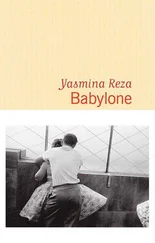In the mornings, when I’m sitting at table faced with Dacimiento’s pound cake and condemned to listen to Nancy crunching her little bits of buttered toast, having already gorged herself on France Inter and Le Figaro — fueled by her incomprehensible appetite to be part of the world, she’s been ready to cross swords since dawn — I have an actual physical sensation of the solitariness of man’s existence. And when your sister thinks to give me pleasure (how am I supposed to forgive her for such utter ignorance of who I am) by telling me “He’s happy, ” I calculate how rare the bridges are from one solitude to another.
Every day the world shrivels me a little and today it’s the world that’s shriveling inside me. That’s the way things are. Little by little death gains the upper hand. One gets used to it. One gets used to death. It’s not such a bad thing to maintain the rhythms of the universe.
In the Kabbalah, which never interested you, doubtless my fault, it says that one has to shake God to make him show Himself . Shake God.
You, my boy, you don’t shake much, do you?
Shake God.
God doesn’t exist, but we make space for Him, we take a little step back so that He will come down to our world, not just every day but several times a day and for our whole lifetime. The only reality is His will, for the world, the world, my boy, is made up of our impatient desires.
And what is it you want? What does my son want?
My son wants neither to build, nor to create, nor to invent. Above all, my son doesn’t want to change the order of things. My son wants everything to be cool.
At a moment when anything is possible, at a moment when I would have risked my skin to keep my place among the living, my son wants calm and creature comforts, my son wants peace to bandage up the pitiful wounds in his soul. I whose only terror has always been daily monotony, I who pushed open the gates of Hell to escape this mortal enemy, I have given life to a windsurfer.
If you were to tell me to pursue a woman to the ends of the earth, I’d bow. Everything to do with desire is desperate and boundless. The need to be someone else, someone whose dream of being swept to his fate would at last be fulfilled, this I understand. And without setting myself up as an authority on disintegration, I understand one could literally be swallowed up in pursuit of it. In your whole life, my boy, has there ever been a Marisa Botton? If so, you couldn’t be happy and nobody would talk about you in such degrading terms, because even if one recovers from a Marisa or someone like her with time, one doesn’t come back from it as the same person one was, one is inconsolable, my child, for that part of oneself one has lost, inconsolable.
Marisa Botton from Rouen, in that way, was my true existential experience.
To begin with, she was nothing. Absolutely nothing. And she would have gone on being nothing if I hadn’t had the idea one day when I was bored, to invent her.
Her name was Christine, and she called herself Marisa. This Marisa gave you the whole woman. She was married, with a child. Married to a buyer from Aunay’s with whom I did business. That’s how I got to know her. At the beginning, completely insignificant. The kind of woman whose dress fits so tightly that she’s still pulling on the material to make the skirt or the sleeve sit better. I passed her from time to time in the corridors at Aunay’s. One day she says, “It’s really irritating,” and I say, “Irritating? Are you talking to me?”
“Yes. You never say hello to me. You could at least say hello.”
“Do we know each other?”
“My husband is Roland Botton. We had dinner together last winter.”
I said hello to her for a year. Because I hadn’t recognized her again, I forced myself to recognize her. See what things depend on. Hello for a year. Nothing more. Translate that into twenty hellos if you reckon that I went to Rouen once or twice a month, because due to a phenomenon I put down as sheer chance, I ran into her each time I was there. Twenty hellos, which evolved from hello madame to hello dear Madame Botton and finally, after passing through several variations, ending with Marisa hello! Never an extra word, never a how are you, nothing. The day I said Marisa hello! she stops: “Such familiarity all of a sudden.” Why did I throw out Marisa hello!? You know me, nice day, unexpected memory of her first name, probably heard it mentioned five minutes before, in short, a momentary whim and suddenly this woman who didn’t exist a second ago, becomes a bodily reality because she decides to take these chance words seriously. “Is that a reproach?”
“Quite the opposite.”
She looks me straight in the eye. Incredible cheek. Smiles and goes off somewhere or other. From that day on, I think about Marisa Botton. That’s it. But it’s enough. It takes a mere nothing, you see, for someone to start making his bed in paradise. Don’t clear the table, leave the crumbs, Dacimiento will sweep up. You can’t not make crumbs eating this cake. You like the cake, that’s good. At least I don’t ruin your appetite anymore. You see how I’ve swelled up? I’m going to croak from intestinal cancer, nobody gives a shit. And I’ve also probably got Kreutzfeld-Jakob disease, since this morning there’s this tremor in my hand. Did you see the stuff she makes me eat? Last night she cooked white beans and ox tongue. Didn’t say a word. Ignoring unbelievably filthy looks from Nancy, I told her I was surprised that she’d take a week’s paid holiday smack in the middle of the year without giving us more than a bare month’s notice. And she starts defending herself, she’s been here for seven years, seven years of pure slavery of course, for seven years and she’s never once asked for however much it is a month she’s supposed to get, she wasn’t hired to do the shopping and since she’s been doing the shopping her lower back is all shot to hell, she’s not even adding in the number of hours she’s had to spend because we sat down late to dinner and the central-heating repairman was waiting outside in the car and of course that meant they had to eat dinner even later but they’re human beings too, just like we are, and so on. Because they’ve got nothing better to do but drive to Auchon now and then and sit glued to the TV, cracking peppercorns in their teeth, and suddenly they’re talking unions, you know. I’m tempted to tell her they’re not even humans, they don’t even qualify for the lowest rung on the pretty damn low ladder of human evolution, and if I manage to restrain myself it’s only due to Nancy’s vindictiveness because for some time, it’s good you should know this, she’s been beating me. Up till now she’s always beaten me in private and I have to say these moments always make me feel tender toward her again, as if this temporary madness is taking me back to the fragile person she was and this unstoppable uncontrollable meltdown is making me desire her again, but I’m afraid one day she’ll lose it and start to hit me in front of Dacimiento, all the more because she’s been developing some kind of weird complicity with Dacimiento recently and isn’t far from turning her into her everyday bosom buddy. (What’s more, Nancy sent her to her own hairdresser, I didn’t dare say a thing but when she came back she looked like Richard Widmark off to the Korean War.) Beating me up in front of Rosa Dacimiento, a scene I can’t rule out, would by the way have the advantage of giving me the chance to rally myself and I could throw her out right then and there. Do they suffer as much as we do? Dacimiento and her central-heating repairman? Without an imagination, you can’t suffer. What kind of suffering can someone experience if they only see the world at their own height, if they can’t look up or look down, if top shelves of bookcases and cornices and curtain rods and tops of wardrobes might as well be in the next world, because they’re not part of this one? Just as much as we do, is what I said. You’ve taken that in. I refuse to see you as suffering’s exile. Even if children don’t remain as warm as you think they will, they’re still your children and I refuse to lose you completely.
Читать дальше












